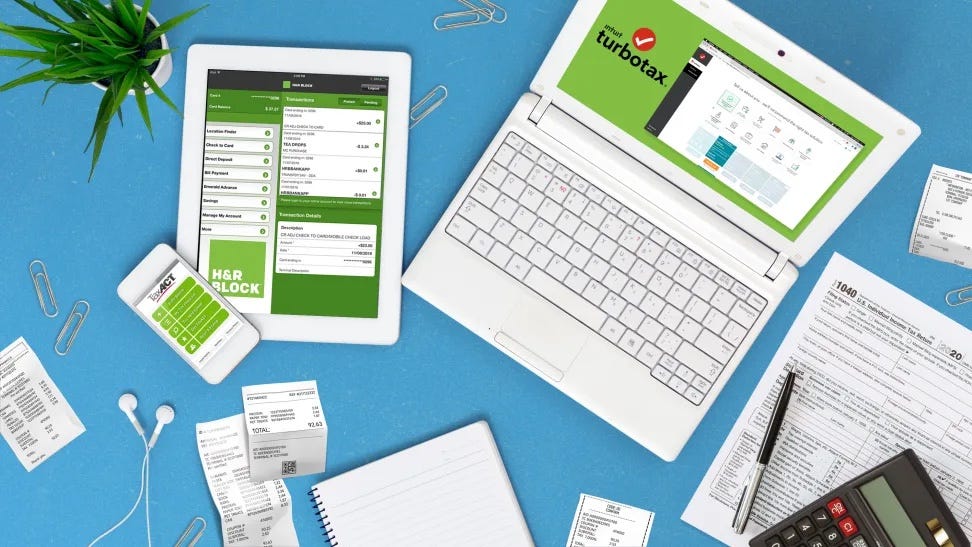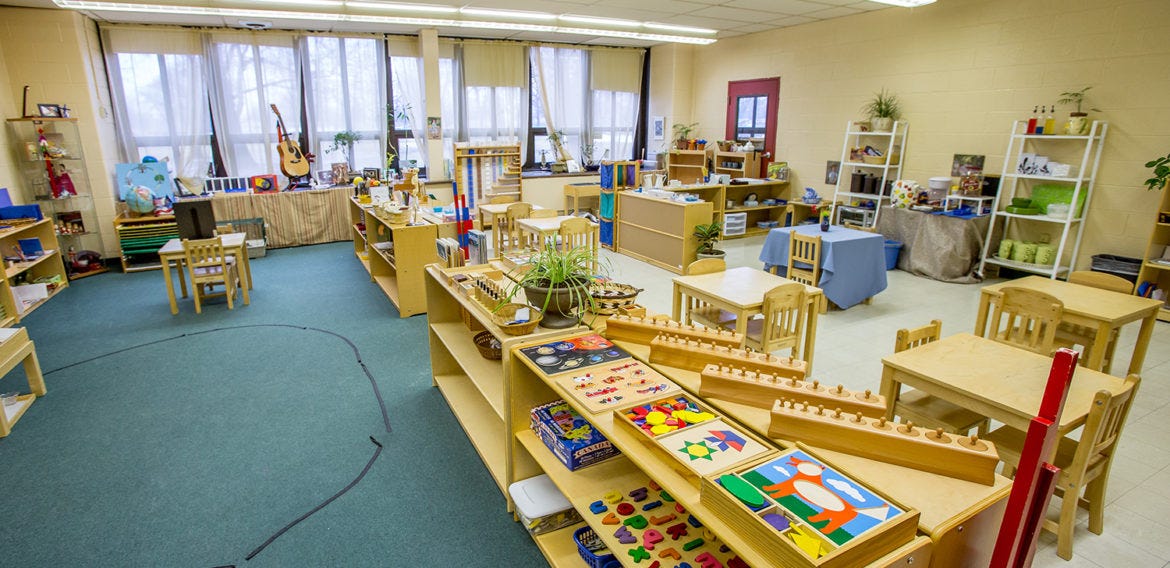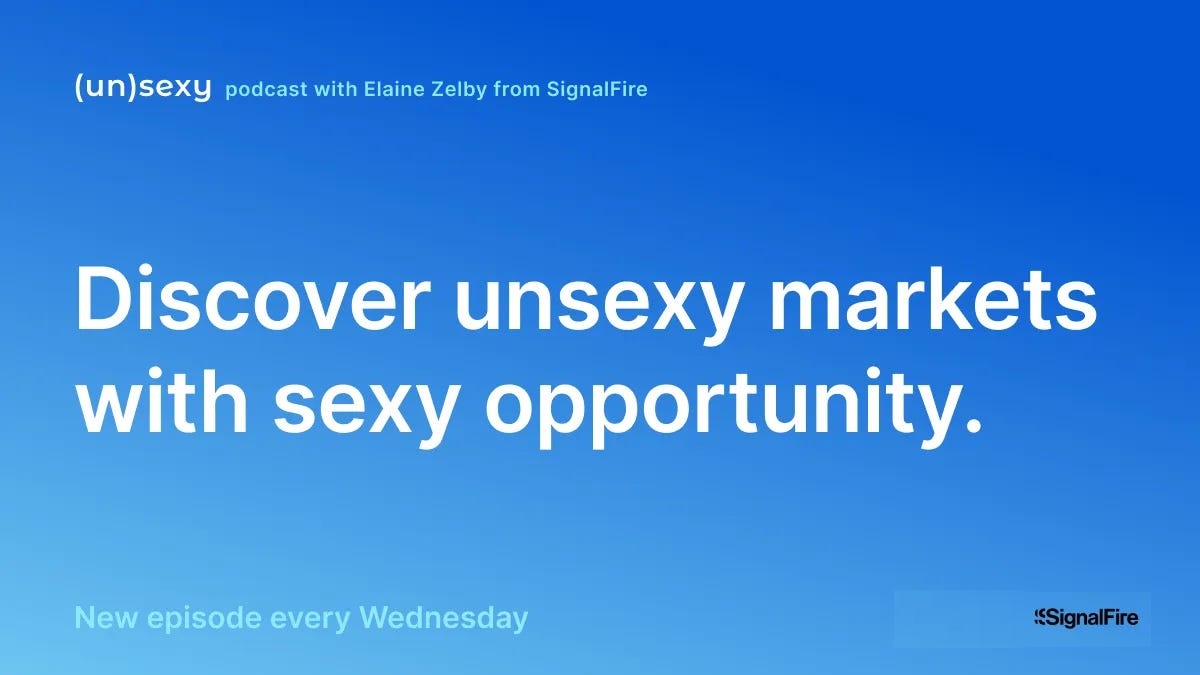Happy Sunday and a very warm welcome to all the new subscribers! I’m thrilled and honored to have you as readers and truly appreciate your thoughts and feedback 🙏. Each edition of 3 Things will contain a dive into 3 rabbit holes I’ve found myself going down recently and associated business opportunities. Subscribe to get each week’s edition straight to your inbox and if you enjoy it, please share (I suck at self-promotion so can use your help)! This past week I’ve been thinking a lot about:
AI Turbotax
Personalized Exec Daily Briefing
Montessori for Adults
1. AI Turbotax
As Benjamin Franklin once said, “in this world nothing can be said to be certain, except death and taxes”. We are getting to that time of year when seemingly never ending forms come in the mail that say “Important Tax Document” on them. Every tax season, Americans spend over $11B on tax preparation services and software with tens of millions of Americans using Turbotax to file their state and federal taxes. While Turbotax provides a valuable solution, it is still extremely manual with workflow software and some very basic rules engine logic. Even as a highly educated person, I find it extremely hard to understand what a lot of the sections mean and if you don’t know specific loopholes or ways to advantage yourself and lower your tax burden, the software is definitely not going to help you. This is why so many wealthy Americans hire tax accountants to stay up to date on all the rules and regulations and know all the loopholes and ways to get the most out of the tax code.
When you think about areas that AI and LLMs can have the most impact, it’s often industries where humans have to go through a tremendous amount of documents and text to do their job. Since the tax laws are extremely numerous, complex, and constantly evolving (plus involve a ton of legal text), this feels like a perfect place to apply AI. Every year, each citizen has to go chase down all of their documents, upload them to Tubotax or send to their tax preparer, and hope that they’ve done everything right. An AI-driven solution could have you sign into all of your your accounts (banks, brokerage accounts, HRIS system, mortgage, etc) as well as ask you a ton of questions using a chatbot that speaks to you in human-understandable language to determine what you are eligible for and which tax breaks you can take advantage of. It could automate much of the manual data entry while ensuring compliance and appropriate filing. After you authorize access to all of your information in one year, the following year will be even easier, making this a very sticky solution, as it will know what has stayed the same and what has changed and can prompt you with questions to make sure that it has all the information it needs (and also take advantage of any new tax code updates). Since everyone is required to file taxes every year, the TAM is pretty massive and the incumbent solutions are either complicated and basic or expensive and services-driven.
2. Personalized Exec Daily Briefing
We used to get a physical newspaper delivered to our doors each day that aggregated all types of news to keep people up to date on important stories and current events. Newspapers were organized into sections so you could peruse the subjects that you cared about and skip the ones you didn’t. With the shift to digital and unbundling of media, most people now subscribe to dozens of niche newsletters and podcasts to get their news. In the work world, there is a similar experience when it comes staying up to date with company and industry info. At enterprise and even mid-market companies, executives spend an inordinate amount of time getting updates from their direct reports on the metrics that matter for their respective orgs, looking at dashboards that have been painstakingly constructed, and reading news and industry reports to stay up to date on all the things that are important for their business. In addition, there has been an absolute explosion of business related independent newsletters, podcasts, industry intelligence, and other forms of content. On both the consumer and business sides, it’s hard to know what to prioritize and which to follow and read.
This past week, the Instagram founders Kevin Systrom and Mike Kreiger announced that they are launching a new project called Artifact which will provide an AI-driven personalized newsfeed, similar to TikTok but for news. While this is not a novel idea and there exists a graveyard of previous attempts such as Pulse, Zite or even Google Reader, the new advances in AI have opened up the door for machine learning to meaningfully improve recommendations which hopefully translates into viral adoption. While I do think that there is a viable consumer play here, I think the larger opportunity lies in a B2B approach. The modern company, especially with hybrid/remote work, has more data and information floating around than ever before. Hundreds of SaaS apps, dozens of Slack channels, transcripts from video conference calls, and an overwhelming amount of email creates information overload and a huge challenge of parsing signal from noise. Plus add in the plethora of blogs, newsletters, and podcasts that are producing content that an exec may want to consume. Since most companies today have some kind of unified BI tool (Looker, Tableau) and collaboration/communication platform (Slack or Teams), you could integrate with those tools (and potentially GSuite for email and calendar info) and pull in relevant industry news from the internet to create personalized daily briefing emails for executives. Help them seamlessly stay up to date on what’s going on inside and outside the company so that they can free up a huge chunk of time to focus on the important things and make better decisions.
3. Montessori for Adults
In the late 1800s, Maria Montessori had just finished her medical training in Rome and began taking an interest in pedagogy and educational theory. In the early 1900s she opened up her first “Casa dei Bambini” or Children’s House where she provided a learning environment for kids focused on the belief that if you let children choose what they spend time doing and act freely within their environment, it would lead to optimal development. In the Montessori method, students work and learn independently and choose what activities they want to engage in. The ethos is centered around self-directed, hands-on learning and collaborative play. Montessori classrooms look very different from your traditional school with various activity stations around the room as opposed to organized desks, teachers who roam about from student to student as opposed to teaching from the front of the class, and mixed age classes. This method of education started taking off in the US in the early 1900s and today there are 5,000 Montessori schools, though the vast majority of them are still private.
While there is a large market for adult education, it is almost always centered around specific job/skills based programs like vocational training or programs such as Master’s degrees, MBAs, or certification courses in industries like data science or cybersecurity for white collar work. Many adults go back to school when they want to make a career pivot or are looking to advance their skills and current progression/ earning potential. Most adults get pushed down a path that is often mostly serendipitous and not intentional without the opportunity to explore what they enjoy doing and what they are best at. The concept of Montessori education is intended to promote exploration, self-discovery, and interaction with others who are both similar and different, all with the guidance of trained teachers. It would be really interesting to adapt this style to adult education, giving adults a space to determine where they want to spend their time and energy, interact with people who come from different backgrounds and have had different work and life experiences, and provide some guide rails and hand-holding. Similar to breaking children up into broad age ranges, you could group adults by general stage of life — 5 years post college, mid-career, and retirement.
That’s all for today! If you have thoughts, comments, or want to get in touch, find me on Twitter at @ezelby and if you enjoyed this, please subscribe and share with a friend or two!
~ Elaine
And in case you like podcasts…
From scrap metal to timber, estate planning to freight pooling, the new (un)sexy podcast is a meandering exploration of just how sexy unsexy industries can be.
Join us weekly as we uncover stories of niche and esoteric markets, understanding their history and looking at the future through the eyes of the pioneering entrepreneurs willing to bring technology and exponential improvements to these often overlooked spaces.
Listen now on Spotify, Apple, Google, or wherever you listen to podcasts.







I *love* the concept of Montessori for adults